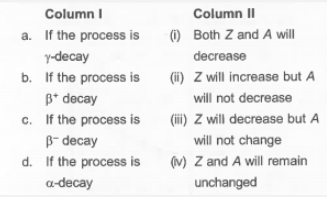All nuclides exhibit radioactivity when the atomic number exceeds
80
83
90
92
The correct Answer is:B
To solve the question regarding the atomic number at which all nuclides exhibit radioactivity, we can follow these steps:
1. Understanding Atomic Number (Z):
- The atomic number (Z) is defined as the number of protons in the nucleus of an atom. It also equals the number of electrons in a neutral atom.
2. Defining Radioactivity:
- Radioactivity is a process by which unstable atomic nuclei lose energy by emitting radiation. This can occur through alpha decay, beta decay, or gamma decay. The goal of these processes is to achieve a more stable nuclear configuration.
3. Identifying the Threshold for Radioactivity:
- It is known from nuclear chemistry that elements with higher atomic numbers tend to be unstable due to the increasing ratio of neutrons to protons. As the atomic number increases, the forces that hold the nucleus together become less effective, leading to instability.
4. Determining the Critical Atomic Number:
- Research and empirical data indicate that all nuclides with an atomic number greater than 83 are radioactive. This means that elements with Z > 83 will exhibit radioactivity.
5. Conclusion:
- Therefore, the answer to the question is that all nuclides exhibit radioactivity when the atomic number exceeds 83.
Final Answer:
All nuclides exhibit radioactivity when the atomic number exceeds 83.
---
- The atomic number (Z) is defined as the number of protons in the nucleus of an atom. It also equals the number of electrons in a neutral atom.
- Radioactivity is a process by which unstable atomic nuclei lose energy by emitting radiation. This can occur through alpha decay, beta decay, or gamma decay. The goal of these processes is to achieve a more stable nuclear configuration.
- It is known from nuclear chemistry that elements with higher atomic numbers tend to be unstable due to the increasing ratio of neutrons to protons. As the atomic number increases, the forces that hold the nucleus together become less effective, leading to instability.
- Research and empirical data indicate that all nuclides with an atomic number greater than 83 are radioactive. This means that elements with Z > 83 will exhibit radioactivity.
- Therefore, the answer to the question is that all nuclides exhibit radioactivity when the atomic number exceeds 83.
All nuclides exhibit radioactivity when the atomic number exceeds 83.
Topper's Solved these Questions
- NUCLEAR CHEMISTRYBOOK - CENGAGE CHEMISTRY ENGLISHCHAPTER - NUCLEAR CHEMISTRYEXERCISE - Exercises Assertion-Reasoning
14 Videos
- NUCLEAR CHEMISTRYBOOK - CENGAGE CHEMISTRY ENGLISHCHAPTER - NUCLEAR CHEMISTRYEXERCISE - Exercise Fill In The Blanks
30 Videos
- NUCLEAR CHEMISTRYBOOK - CENGAGE CHEMISTRY ENGLISHCHAPTER - NUCLEAR CHEMISTRYEXERCISE - Exercises Multiple Correct
26 Videos
- NCERT BASED EXERCISEBOOK - CENGAGE CHEMISTRY ENGLISHCHAPTER - NCERT BASED EXERCISEEXERCISE - Nuclear Chemistry (NCERT Exercise)
29 Videos
- ORGANIC COMPOUNDS WITH FUNCTIONAL GROUPBOOK - CENGAGE CHEMISTRY ENGLISHCHAPTER - ORGANIC COMPOUNDS WITH FUNCTIONAL GROUPEXERCISE - Archives Analytical And Descriptive
24 Videos
Similar Questions
Knowledge Check
When a nucleus in an atom undergoes a radioactive decay the electronic energy levels of the atom
Ado not change for any type of radioactivityBchange for α and β radioactivity but not for γ-radioactivityCchange for α-radioactivity but not for othersDchange for β-radioactivity but not for others
In a radioactive decay, neither the atomic number nor the mass number changes. Which of the following particles is emitted in the decay?
View SolutionMatch the column in radioactive decay process of nucleus with atomic number Z and mass number A.

View SolutionWhen the atomic number Z of the nucleus increases
View SolutionWhen a nucleus in an atom undergoes a radioactive decay, the electronic energy levels of the atom.
View SolutionTwo nuclides A and B are isotonic .Their mass number are 76 and 77 respectively .If the atomic number of A is 32 then the atomic number of B will be
View SolutionWhat kind of change takes place in a nucleus when a γ-particle is emitted ? Express it by an equation. State whether (a) atomic number, and (b) mass number are conserved in a radioactive γ-decay ?
View SolutionA certain radioactive nucleus emits a particle that leaves its mass number unchanged, but increases its atomic number by one. Identify the particle and write its symbol.
View Solution
